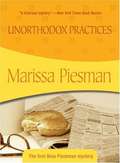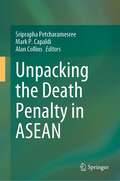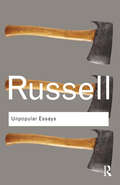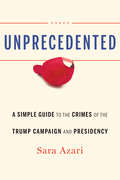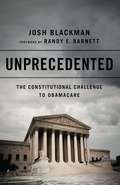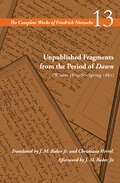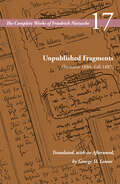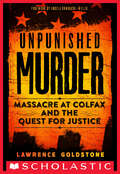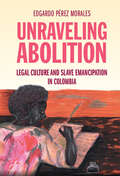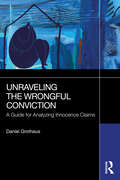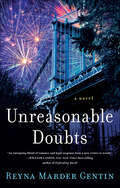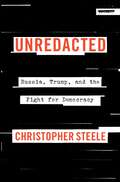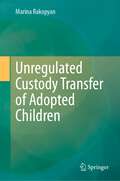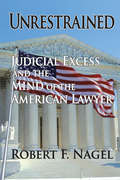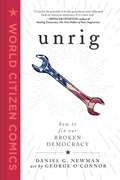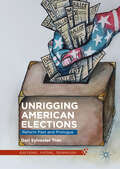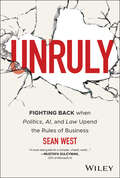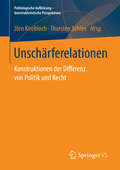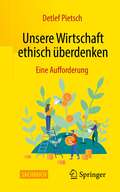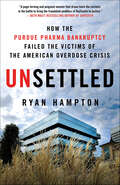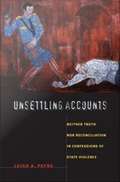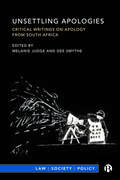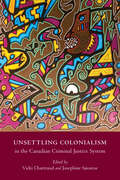- Table View
- List View
Unorthodox Lawmaking: New Legislative Processes in the U.S. Congress
by Ms Barbara SinclairDespite what your students may have learned in Schoolhouse Rock, the textbook "how-a-bill-becomes-a-law" scenario is a rarity. As evidenced with health care reform legislation, most major measures wind their way through the contemporary Congress in what Barbara Sinclair has dubbed "unorthodox lawmaking."Whatever path a bill takes--whether considered by multiple committees or subjected to a filibuster in the Senate--Sinclair explores the full range of special procedures and processes that make up the legislative process, as well as the reasons these unconventional routes evolved. This much-anticipated fourth edition updates the book through the end of the 111th Congress. Sinclair incorporates new examples and new case studies throughout, including the economic stimulus bill of 2008, the American Recovery and Reinvestment Act of 2009, and, of course, the health care reform legislation of 2009-2010. New coverage also includes recent developments in the Senate (for example, filling the amendment tree); major changes in how the House and Senate resolve their differences (fewer conferences and more informal bargaining and amendments); and earmarks and changes in the appropriations process. With Sinclair's unique perspective, Unorthodox Lawmaking introduces students to the intricacies of Congress while also providing the tools to assess the relative successes and limitations of the legislative process.
Unorthodox Practices
by Marissa PiesmanThink the real-estate market is a current craze? Welcome to New York in the 1980s, where the best thing about being obsessed with real estate is that, as a conversational topic, you can count on it to just naturally arise about every ten minutes. Nina Fischman mostly opts out of those conversations: She's too busy running down to Housing Court on behalf of her poverty law clients, and tracking down sales on sweaters that camouflage the hips. But Nina's mother, Ida, has a nose for the market, and that nose gets twitchy when old ladies in her neighborhood start dying, leaving apartments that have miraculously escaped what New Yorkers delicately call ?the cockroach problem. Over a nice snack of low-fat cottage cheese, she nags Nina into snooping around. And Nina is soon forced, reluctantly, to agree with her mother: Somebody's making a killing in real estate.
Unpacking the Death Penalty in ASEAN
by Alan Collins Sriprapha Petcharamesree Mark P. CapaldiThis book contributes conceptually, theoretically and morally to a deeper understanding of the distinctive Asian perceptions of punishment, justice and human rights. Researched and prepared by scholars who have not only been conducting studies on the death penalty in the region but have also been advocating for legal reforms, this edited book touches upon the different justifications for the use of capital punishment in the ASEAN region, exposing the secrecy, sensitivities and dilemmas that mask violations of international human rights laws. The chapters bring in numerous new perspectives which have been overlooked in the traditional discourse surrounding the use of the death penalty, such as that around crimes that do not meet the threshold of “most serious”; the dignity of death row inmates and their families; contradictions within religion and capital punishment; and the way in which growing authoritarianism and the media are adversely influencing the public’s perception and support for capital punishment in the region. In examining how public opinion shapes state policies towards the death penalty and how it varies according to different offences and different states, the authors critically analyse how the international human rights mechanisms have specifically called for ASEAN member states to refrain from extending the application of the death penalty and to limit it to the “most serious crimes.” Relevant to socio-legal scholars focused on crime and punishment in Southeast Asia, and in the Global South more broadly, this is a landmark collection in criminology and human rights scholarship. Chapter "ASEAN and the Death Penalty: Theoretical and Legal Views and a Pathway to Abolition" is available open access under a Creative Commons Attribution 4.0 International License via link.springer.com.
Unpopular Essays
by Bertrand RussellA classic collection of Bertrand Russell’s more controversial works, reaffirming his staunch liberal values, Unpopular Essays is one of Russell’s most characteristic and self-revealing books. Written to "combat… the growth in Dogmatism", on first publication in 1950 it met with critical acclaim and a wide readership and has since become one of his most accessible and popular books.
Unprecedented: A Simple Guide to the Crimes of the Trump Campaign and Presidency
by Sara AzariThe Trump administration&’s attempted and actual violations of the Constitution and the law have surpassed our worst expectations again and again. Add to that the legal morass surrounding members of the Trump campaign staff, and the United States finds itself led by the most corrupt administration in modern American history. The investigation by Special Counsel Robert Mueller on 2016 election interference and obstruction of justice led to multiple indictments that boggle even the brightest legal minds. So how can the rest of us make sense of it all? Sara Azari breaks down the investigations, evidence, criminal charges, and defenses involving an ever-expanding rogues&’ gallery of Trump associates and campaign members, as well as the president&’s own criminal conduct. Her docket also includes a comprehensive summary and expert analysis of the Mueller Report. Azari addresses the consequences of President Trump&’s conduct and considers whether the president of the United States is ever above the law. An essential nonpartisan guide, Unprecedented gives readers the tools they need to understand the legal issues engulfing Trump&’s campaign and presidency.
Unprecedented: The Constitutional Challenge to Obamacare
by Randy E. Barnett Josh BlackmanIn 2012, the United States Supreme Court became the center of the political world. In a dramatic and unexpected 5-4 decision, Chief Justice John Roberts voted on narrow grounds to save the Affordable Care Act, commonly known as Obamacare. Unprecedented tells the inside story of how the challenge to Obamacare raced across all three branches of government, and narrowly avoided a constitutional collision between the Supreme Court and President Obama. <p><p> On November 13, 2009, a group of Federalist Society lawyers met in the Mayflower Hotel in Washington, D.C., to devise a legal challenge to the constitutionality of President Obama's "legacy" — his healthcare reform. It seemed a very long shot, and was dismissed peremptorily by the White House, much of Congress, most legal scholars, and all of the media. Two years later the fight to overturn the Affordable Care Act became a political and legal firestorm. When, finally, the Supreme Court announced its ruling, the judgment was so surprising that two cable news channels misreported it and announced that the Act had been declared unconstitutional. <p> Unprecedented offers unrivaled inside access to how key decisions were made in Washington, based on interviews with over one hundred of the people who lived this journey — including the academics who began the challenge, the attorneys who litigated the case at all levels, and Obama administration attorneys who successfully defended the law. It reads like a political thriller, provides the definitive account of how the Supreme Court almost struck down President Obama's "unprecedented" law, and explains what this decision means for the future of the Constitution, the limits on federal power, and the Supreme Court.
Unpublished Fragments from the Period of Dawn: Volume 13 (The Complete Works of Friedrich Nietzsche)
by Friedrich NietzscheThis volume provides the first English translation of Nietzsche's unpublished notes from late 1879 to early 1881, the period in which he authored Dawn, the second book in the trilogy that began with Human, All Too Human and concluded with The Joyful Science. In these fragments, we see Nietzsche developing the conceptual triad of morals, customs, and ethics, which undergirds his critique of morality as the reification into law or dogma of conceptions of good and evil. Here, Nietzsche assesses Christianity's role in the determination of moral values as the highest values and of redemption as the representation of humanity's highest aspirations. These notes show the resulting tension between Nietzsche's contrasting thoughts on modernity, which he critiques as an unrecognized aftereffect of the Christian worldview, but also views as the springboard to "the dawn" of a transformed humanity and culture. The fragments further allow readers insight into Nietzsche's continuous internal debate with exemplary figures in his own life and culture—Napoleon, Schopenhauer, and Wagner—who represented challenges to hitherto existing morals and culture—challenges that remained exemplary for Nietzsche precisely in their failure. Presented in Nietzsche's aphoristic style, Dawn is a book that must be read between the lines, and these fragments are an essential aid to students and scholars seeking to probe this work and its partners.
Unpublished Fragments: Volume 17 (The Complete Works of Friedrich Nietzsche)
by Friedrich NietzscheThe Complete Works of Friedrich Nietzsche will publish in its entirety, for the first time, an English translation of the full contents of the Kritische Studienausgabe. This volume of the Complete Works provides the first English translation of Nietzsche's unpublished notes from Summer 1886 through Fall 1887. In these writings we find drafts of new prefaces for the second editions of his earlier works, notes for the soon-to-appear On the Genealogy of Morality, and crucially, fragments and plans for an anticipated "master work" under the title "The Will to Power." This projected work, as is now well-known, was never written by Nietzsche; instead, it was fraudulently assembled by his sister Elisabeth Förster-Nietzsche and his friend Heinrich Köselitz (aka Peter Gast) and published under Nietzsche's name after his death. Only now, with the publication of this volume and the ones that precede and follow it, are English readers able to examine for themselves the full set of unpublished writings of the last creative period of Nietzsche's life. Taking into account the latest editorial work on his final notebooks, and including a detailed account by Mazzino Montinari of Nietzsche's decision not to complete a "master work," this volume documents the evolution of Nietzsche's thinking on such important themes as nihilism, eternal recurrence, and the revaluation of all values as it presents his late Nachlass free from the distortions perpetrated against it over a century ago.
Unpunished Murder: Massacre at Colfax and the Quest for Justice
by Lawrence GoldstoneHow the Supreme Court turned a blind eye on justice, stripped away the equal rights promised to all Americans, and ushered in the era of Jim Crow.On Easter Sunday of 1873, just eight years after the Civil War ended, a band of white supremacists marched into Grant Parish, Louisiana, and massacred over one hundred unarmed African Americans. The court case that followed reached the highest court in the land. Yet, following one of the most ghastly incidents of mass murder in American history, not one person was convicted.The opinion issued by the Supreme Court in US v. Cruikshank set in motion a process that would help create a society in which Black Americans were oppressed and denied basic human rights—legally, according to the courts. These injustices paved the way for Jim Crow and would last for the next hundred years. Many continue to exist to this day.In this compelling and thoroughly researched volume for young readers, Lawrence Goldstone traces the evolution of the law and the fascinating characters involved in the story of how the Supreme Court helped institutionalize racism in the American justice system.“Spotlighting an event seldom discussed in books for young people, Goldstone provides a complex, useful historical context for understanding issues surrounding race and justice.” —Booklist (starred review)“A unique look at not only the massacre in question, but also at the history and workings of the Supreme Court of the United States.” —School Library Connection“The book is, in large part, the story of how racism evolves, persisting in laws and politics despite major social advances.” —The Horn Book (starred review)
Unraveling Abolition: Legal Culture and Slave Emancipation in Colombia (Studies in Legal History)
by Edgardo Pérez MoralesUnraveling Abolition tells the fascinating story of slaves, former slaves, magistrates and legal workers who fought for emancipation, without armed struggle, from 1781 to 1830. By centering the Colombian judicial forum as a crucible of antislavery, Edgardo Pérez Morales reveals how the meanings of slavery, freedom and political belonging were publicly contested. In the absence of freedom of the press or association, the politics of abolition were first formed during litigation. Through the life stories of enslaved litigants and defendants, Pérez Morales illuminates the rise of antislavery culture, and how this tradition of legal tinkering and struggle shaped claims to equal citizenship during the anti-Spanish revolutions of the early 1800s. By questioning foundational constitutions and laws, this book uncovers how legal activists were radically committed to the idea that independence from Spain would be incomplete without emancipation for all slaves.
Unraveling the Wrongful Conviction: A Guide for Analyzing Innocence Claims
by Daniel GrothausThis book lays out the author’s proven approach to investigating and assessing a defendant’s claim of innocence whether pre-trial or post-conviction. The author weaves his 35 years of experience into a simple step-by-step process, showing the reader how to objectively investigate a wrongful conviction. He uses his case histories to describe an alternative to the “trial and error” methods so often used. As a result, this book offers a methodical and repeatable approach to assessing and investigating a defendant’s claim of innocence. The book refers to the actual investigations, which led to dozens of exonerations, prison releases, acquittals, and dismissed charges in Murder I cases.Claims of innocence may be common, but knowledge of an objective way to assess those claims is hardly universal. This book was written for the classroom and the field. It is essential reading for the student, the Innocence Project volunteer, practitioner, or anyone interested in correcting a wrongful conviction or avoiding the next false conviction.Special Offer for Adopters! Delve more deeply into the fact-finder’s role by featuring expert Dan Grothaus in a virtual presentation to your class. Grothaus offers a gratis 45-minute zoom presentation to any class of students using this book in their curriculum. The opportunity could be used by the class to ask questions or discuss any aspect of the book. It is possible the zoom might include an exoneree drop-in. Queries may be made directly to the author at: djgrothaus@gmail.com
Unravelling Tort and Crime
by Matthew DysonTort law and criminal law are closely bound together but their relationship rarely receives sustained and rigorous scrutiny. This is the first significant project in England and Wales to address that shortcoming. Building on growing interest amongst both academics and practitioners in the relationship between tort and crime, it draws together leading experts to chart the field and explore key points of interest. It uses a range of perspectives from legal theory, doctrine, legal history and comparative law to address some of the most important and interesting links between tort and crime. Examples include how the illegality defence operates to avoid stultification of the law, the difference between criminal and civil causation, how the Motor Insurers' Bureau not only insures but acts to enforce laws and alter behaviour, and why civil law only very rarely restores specific property but the criminal law does it daily.
Unreasonable Doubts: A Novel
by Reyna Marder GentinJaded New York City Public Defender Liana Cohen would give anything to have one client in whom she can believe. Dozens of hardened criminals and repeat offenders have chipped away at her faith in both herself and the system. Her boyfriend Jakob’s high-powered law firm colleagues see her do-gooder job as a joke, which only adds to the increasing strain in their relationship. Enter imprisoned felon Danny Shea, whose unforgivable crime would raise a moral conflict in an attorney at the height of her idealism—and that hasn't been Liana in quite a while. But Danny's astonishing blend of good looks, intelligence, and vulnerability intrigues Liana. Could he be the client she’s been longing for—the wrongly accused in need of a second chance? Is he innocent? As their attorney-client relationship transforms into something less than arm’s length, Liana is forced to confront fundamental questions of truth, faith, and love—and to decide who she wants to be.
Unredacted: Russia, Trump, and the Fight for Democracy
by Christopher SteeleThe intelligence officer behind the explosive “Steele Dossier” steps out of the shadows, revealing a searing new report on the threat Putin and Trump pose to democracy, based on alarming intelligence exposed in these pages for the first time“Putin is now desperate to have Donald Trump back in the White House. If he succeeds in helping Trump get reelected, I am convinced that the global political order will be utterly changed. We shall have entered a new historical era of strategic chaos, a ‘new world disorder.’ The consequences of Trump winning the 2024 election are catastrophic.” –from UnredactedTo a unique degree, Christopher Steele has been an eyewitness observer of modern Russian history. He was a British diplomat and intelligence professional in Moscow when the Soviet Union was collapsing. Steele was there when the putsch against Mikhail Gorbachev took place and when Boris Yeltsin took over the newly independent Russia. After Vladimir Putin came to power, Steele rose to become one of British government’s leading Russia experts and played a central role in the investigation into the Kremlin-ordered murder of Alexander Litvinenko. Then, in 2016, he wrote a series of explosive reports about the then presidential candidate Donald Trump and his links to Russia. Now known to the world as the “Steele Dossier,” these intelligence documents drew the world’s attention to Russia’s relationship with Trump—and reluctantly thrust Steele into the center of a global maelstrom. Since Trump’s election, he has quietly continued his work. Indeed, Steele has had even better access to sources of information and intelligence on Russia—ones that have given him a privileged view of what’s going on inside the Kremlin, and how much we in the West should worry about it. In Unredacted, Steele shares for the first time what that inside view looks like, how he came to the point of gaining such a level of insight, and what Western governments—and all of us—can and should do to counter this generational threat.
Unregulated Custody Transfer of Adopted Children
by Marina RakopyanDid you know that once a week an adopted child is advertised to be given away on Internet? The book “Unregulated Custody Transfer of Adopted Children’ is a thought-provoking and an eye-opening book that uncovers the gray zone of adoption. The book talks about the often-overlooked issue of the terrifying reality of national and international adoption. Through legal analysis and accompanying story this book sheds light on the heart-wrenching reality of children who have been rehomed. It delves into the lives of adoptive families who find themselves overwhelmed and unable to care for their adopted children, leading to a black market of custody transfer where vulnerable children are given away with one click and with just one piece of paper to strangers. This book is a must-read for as it highlights the urgent need for increased regulation and oversight to protect the well-being of children in need of safe and loving homes. Particular attention is given to the international adoption and the countries such as Russia and Ukraine. The author has played close attention to the laws and regulations in the above mentioned countries by first hand translation and research, in order to give a deeper insights into the heartbreaking reality of unregulated custody transfer of adopted children. The book provides helpful insights for lawmakers, legal practitioners, scholars, child care professionals, international law scholars and students interested in human rights law, adoption law, and child protection.
Unrestrained: Judicial Excess and the Mind of the American Lawyer
by Robert F. NagelRobert Nagel's innovative volume attempts to explain why, despite almost four decades of conservative and moderate appointments, the Supreme Court continues to intervene aggressively in a wide array of social and political issues. The explanation lies primarily in the psychological effects of the way that lawyers think about law and judging. The instincts ingrained by the experiences common to legal education and the successful practice of law also work to encourage the reckless use of power.Nagel argues that the problem with the modern judicial role is cultural and political. He demonstrates that judges, especially Supreme Court justices, have degraded our political discourse, intensified social conflict, and drained moral confidence.By examining modern Supreme Court confirmation hearings along with certain classic legal writings, Nagel shows how modern lawyers have a broad consensus on how to interpret the Constitution and, more generally, how to think about law. One major component of this mindset is to combine realism with legalism in ways that naturally tend to expand the judiciary's imperial role. Realism counsels that decisions are inevitably partly personal and therefore cannot be conclusively justified while legalism imparts the sense that the judge's interpretation is the best one possible. This combination of the personal and political, along with other aspects of modem legal thinking and training, means that judges are not only unconstrained by professional norms but actually are impelled by them to use power expansively.This issue is important to every person living in the U.S., as the Supreme Court's decisions concern everyone in the nation. It has the potential to be read by lawmakers, lawyers, students of law and political science, and anyone interested in Constitutional law. The thesis is unique and the execution is precise.
Unrig: How to Fix Our Broken Democracy (World Citizen Comics)
by Daniel G. NewmanAn intriguing and accessible nonfiction graphic novel about the role wealth and influence play in American democracy.Despite our immense political divisions, Americans are nearly united in our belief that something is wrong with our government: It works for the wealthy and powerful, but not for anyone else. Unrig exposes the twisted roots of our broken democracy and highlights the heroic efforts of those unrigging the system to return power to We the People.This stirring nonfiction graphic novel by democracy reform leader Daniel G. Newman and artist George O’Connor takes readers behind the scenes—from the sweaty cubicles where senators dial corporate CEOs for dollars, to lavish retreats where billionaires boost their favored candidates, to the map rooms where lawmakers scheme to handpick their voters. Unrig also highlights surprising solutions that limit the influence of big money and redraw the lines of political power.If you're overwhelmed by negative news and despairing for the direction of our country, Unrig is a tonic that will restore your faith and reveal the path forward to fix our broken democracy.
Unrigging American Elections: Reform Past and Prologue (Elections, Voting, Technology)
by Dari Sylvester TranThis critical and systematic analysis of election reforms post-HAVA (Help America Vote Act of 2002) offers a detailed look ahead at the significant challenges that remain in the context of a new presidential administration. Employing a mixed methodological approach, this book analyzes the biggest election challenges faced by voters and election administrators in the areas of voter registration, polling place and non-polling place voting, election administration personnel, and voting technology. Within the framework of the competing values of integrity and access, this book fills a crucial gap in the existing literature by analyzing the impact of election reform wins and losses. The book concludes with a promising agenda for the future of election reform and the political considerations that will be brought to bear on that agenda.
Unruly: Fighting Back when Politics, AI, and Law Upend the Rules of Business
by Sean WestA bold exploration of modern business risk in a volatile world where traditional rules no longer apply In Unruly: Fighting Back when Politics, AI, and Law Upend the Rules of Business, co-founder of software company Hence Technologies and former Global Deputy CEO of Eurasia Group, Sean West, delivers a startlingly insightful new take on how politics, technology and law are converging to upend the rules of business, generating dangerous risks and incredible opportunities. West convincingly argues that we must understand all three factors to get leverage over the future – a future filled with eroding rule of law, deepfakes that upend elections and court decisions, government pressure for businesses to be patriotic, robot lobbyists, a flood of automated legal claims pointed directly at your company and much more. Unruly offers detailed, practical advice for how to understand the world ahead, how to be resilient in the face of innumerable and complex challenges, and how to surround your business with the people and technology you need to excel in this environment. Inside the book: A framework for understanding all of the pressures on modern corporations from the convergence of geopolitics, technology and law. Strategies for turning your company's legal department into a source of enduring competitive advantage How to navigate government pressure for nationalism when you have a global footprint Approaches to winning in a world where courts are politicized and the law is increasingly automated, built on interviews with top experts Ways to deal with the backlash to ESG at a company level Perfect for executives, managers, entrepreneurs, founders, and other business leaders, Unruly is also a must-read for general counsels and the advisors who serve them.
Unschärferelationen: Konstruktionen der Differenz von Politik und Recht (Politologische Aufklärung – konstruktivistische Perspektiven)
by Jörn Knobloch Thorsten SchleeDas prekäre Verhältnis von Politik und Recht ist ein beständiges Thema der Politikwissenschaft und öffentlicher demokratischer Diskurse. Die in diesem Band versammelten Beiträge fokussieren das umstrittene Verhältnis von Politik und Recht in Auseinandersetzung mit konstruktivistischen Theorien der Politik. Sie weisen das Verhältnis zweier Semantiken und die ihm zugeschriebenen Kausalitätsbeziehungen in der Zusammenschau als Unschärferelationen aus. Der Band identifiziert die Unschärfen des Zusammenspiels von Politik und Recht in Fragen der Gründung von Demokratie und Verfassung, in den Diskursen um die Politisierung der Verfassungsgerichtsbarkeit wie umgekehrt der Verrechtlichung des Politischen und nicht zuletzt in Kontexten der Produktion internationaler Normen wie auch der Kollision internationaler Rechtsregime.
Unsere Wirtschaft ethisch überdenken: Eine Aufforderung
by Detlef PietschEs läuft ganz und gar nicht rund in unserer Wirtschaft: Kam bereits vor der Pandemie der Wohlstand nicht mehr bei allen an, wurde die soziale Ungleichheit durch Corona noch weiter verschärft. Von Bildungsgerechtigkeit konnte spätestens zu Zeiten von Homeschooling nicht mehr die Rede sein. Zusätzlich bedrohte Hochwasser im Sommer 2021 einige Gebiete in Deutschland und hinterließ viele Tote. Einige verloren in kurzer Zeit ihr Hab und Gut und standen buchstäblich vor dem Nichts. Der Klimawandel ist nicht mehr zu leugnen, er hat uns alle mit Wucht erfasst. Dass wir die Ökonomie dringend mit der Ökologie versöhnen müssen, ist mittlerweile allen klar. Die Frage ist lediglich, wie das konkret aussehen soll. Nehmen wir diese Ereignisse als Aufforderung, intensiv darüber nachzudenken und zu diskutieren, wie wir unsere Wirtschaft ethisch auf ein neues Niveau heben können.
Unsettled: How the Purdue Pharma Bankruptcy Failed the Victims of the American Overdose Crisis
by Ryan HamptonA shocking inside account of reckless capitalism and injustice in the Purdue Pharma bankruptcy case.In September 2019, Purdue Pharma—the maker of OxyContin and a company controlled by the infamous billionaire Sackler family—filed for bankruptcy to protect itself from 2,600 lawsuits for its role in fueling the U.S. overdose crisis. Author and activist Ryan Hampton served as co-chair of the official creditors committee that acted as a watchdog during the process, one of only four victims appointed among representatives of big insurance companies, hospitals, and pharmacies. He entered the case believing that exposing the Sacklers and mobilizing against Purdue would be enough to right the scales of justice. But he soon learned that behind closed doors, justice had plenty of other competition—and it came with a hefty price tag.Unsettled is the inside story of Purdue’s excruciating Chapter 11 bankruptcy proceedings, the company’s eventual restructuring, and the Sackler family’s evasion of any true accountability. It’s also the untold story of how a group of determined ordinary people tried to see justice done against the odds—and in the face of brutal opposition from powerful institutions and even government representatives. Although America was envisioned as an equitable place, where the vulnerable are protected from the greed of the powerful, the corporate-bankruptcy process betrays those values. In its heart of hearts, this system is built to shield the ultra-wealthy, exploit loopholes for political power, promote gross wealth inequality, and allow companies such as Purdue Pharma to run amok.The real story of the Purdue bankruptcy wasn’t that the billion-dollar corporation was a villain, a serial federal offender. No matter what the media said, Purdue didn’t do this alone. They were aided and abetted by the very systems and institutions that were supposed to protect Americans. Even on-your-side elected officials worked against Purdue’s victims—maintaining the status quo at all costs.Americans deserve to know exactly who is responsible for failing to protect people over profits—and what a human life is worth to corporations, billionaires, and lawmakers. Unsettled is what happened behind closed doors—the story of a sick, broken system that destroyed millions of lives and let the Sacklers off almost scot-free.
Unsettling Accounts: Neither Truth Nor Reconciliation in Confessions of State Violence
by Leigh A. PayneAn Argentine naval officer remorsefully admits that he killed thirty people during Argentina's Dirty War. A member of General Augusto Pinochet's intelligence service reveals on a television show that he took sadistic pleasure in the sexual torture of women in clandestine prisons. A Brazilian military officer draws on his own experiences to write a novel describing the military's involvement in a massacre during the 1970s. The head of a police death squad refuses to become the scapegoat for apartheid-era violence in South Africa; he begins to name names and provide details of past atrocities to the Truth Commission. Focusing on these and other confessions to acts of authoritarian state violence, Leigh A. Payne asks what happens when perpetrators publicly admit or discuss their actions. While mechanisms such as South Africa's Truth and Reconciliation Commission are touted as means of settling accounts with the past, Payne contends that public confessions do not settle the past. They are unsettling by nature. Rather than reconcile past violence, they catalyze contentious debate. She argues that this debate--and the public confessions that trigger it--are healthy for democratic processes of political participation, freedom of expression, and the contestation of political ideas. Payne draws on interviews, unedited television film, newspaper archives, and books written by perpetrators to analyze confessions of state violence in Argentina, Chile, Brazil, and South Africa. Each of these four countries addressed its past through a different institutional form--from blanket amnesty, to conditional amnesty based on confessions, to judicial trials. Payne considers perpetrators' confessions as performance, examining what they say and what they communicate nonverbally; the timing, setting, and reception of their confessions; and the different ways that they portray their pasts, whether in terms of remorse, heroism, denial, or sadism, or through lies or betrayal.
Unsettling Apologies: Critical Writings on Apology from South Africa (Law, Society, Policy)
by Melanie Judge and Dee SmytheThere has recently been a global resurgence of demands for the acknowledgement of historical and contemporary wrongs, as well as for apologies and reparation for harms suffered. Drawing on the histories of injustice, dispossession and violence in South Africa, this book examines the cultural, political and legal role, and value of, an apology. It examines the multiple ways in which ‘sorry’ is instituted, articulated and performed, and critically analyses its various forms and functions in both historical and contemporary moments. Bringing together an interdisciplinary team of contributors, the book’s analysis offers insights that will be invaluable to global debates on the struggle for justice.
Unsettling Colonialism in the Canadian Criminal Justice System
by Vicki Chartrand Josephine SavareseThe development of the Canadian criminal justice system has been central to the dispossession of Indigenous populations and the safeguarding of colonial relations of power. Through the mechanisms of surveillance, segregation, and containment, the justice system ensures that Indigenous peoples remain in a state of economic deprivation, social isolation, and political subjection. Contributors to this volume examine historical expressions and ongoing reinforcement of settler colonialism with a view to illuminating how it manifests in contemporary police actions and criminal proceedings. Using an anti-colonial lens, alternative conceptualizations and practices of justice are explored. The volume includes testaments from Indigenous people currently in federal penitentiaries across Canada that show current penal and carceral arrangements for Indigenous people.

